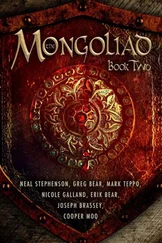Neal Stephenson - The Mongoliad - Book One
Здесь есть возможность читать онлайн «Neal Stephenson - The Mongoliad - Book One» весь текст электронной книги совершенно бесплатно (целиком полную версию без сокращений). В некоторых случаях можно слушать аудио, скачать через торрент в формате fb2 и присутствует краткое содержание. Город: Las Vegas, Год выпуска: 2012, ISBN: 2012, Издательство: 47North, Жанр: Эпическая фантастика, Фэнтези, на английском языке. Описание произведения, (предисловие) а так же отзывы посетителей доступны на портале библиотеки ЛибКат.
- Название:The Mongoliad: Book One
- Автор:
- Издательство:47North
- Жанр:
- Год:2012
- Город:Las Vegas
- ISBN:978-1-61218-236-0
- Рейтинг книги:5 / 5. Голосов: 1
-
Избранное:Добавить в избранное
- Отзывы:
-
Ваша оценка:
- 100
- 1
- 2
- 3
- 4
- 5
The Mongoliad: Book One: краткое содержание, описание и аннотация
Предлагаем к чтению аннотацию, описание, краткое содержание или предисловие (зависит от того, что написал сам автор книги «The Mongoliad: Book One»). Если вы не нашли необходимую информацию о книге — напишите в комментариях, мы постараемся отыскать её.
The Mongoliad: Book One — читать онлайн бесплатно полную книгу (весь текст) целиком
Ниже представлен текст книги, разбитый по страницам. Система сохранения места последней прочитанной страницы, позволяет с удобством читать онлайн бесплатно книгу «The Mongoliad: Book One», без необходимости каждый раз заново искать на чём Вы остановились. Поставьте закладку, и сможете в любой момент перейти на страницу, на которой закончили чтение.
Интервал:
Закладка:
Strange, then, to find a fully armored knight lying dead on the ground, out in the open. That he had been dead for some little while was proved by the number of flies teeming around him. His shirt of mail, and the shape of his helmet and of his shield, identified him as a knight of Christendom—this was no Mongol. He had gone down on his belly, his shield lying flat beneath him. But his head was turned awkwardly to one side and the neck bent back. As they drew closer—though only a little closer, given the stink and the number of flies—they got a clue as to why: he had taken a single arrow through the T-slot of his helmet, right into the cheekbone below the right eye, and its nock had struck the ground as he had fallen and wrenched his head around.
Their first instinct, of course, was to look up at the top of the wall and judge the range. They were certainly within bowshot, but far enough away that the archer who had loosed this shaft must have been lucky, or exceptionally good. Several bows were visible along the top of the wall now, and distant creaking noises indicated that some of them were being drawn. Raphael’s instinct was to seek cover, but Percival reacted in the opposite manner, turning toward the defenders and holding his hands up, palms out.
“Hold!” he called. “We are knights of Christendom and no enemies of yours.”
Raphael winced at the Frank’s naïveté. Could it really be that a man of his upbringing would not know of the Fourth Crusade and the atrocities inflicted by Christian knights of the West against their brethren in Zara and Constantinople?
“Before you try our patience with any more such foolish remarks,” called back a voice—the voice, Raphael realized, of a woman, speaking in Latin, “pray satisfy your curiosity about the Christian knight who lies at your feet. Ask yourself how he ended up in that estate if he was not our enemy, and then consider the wisdom of drawing any closer to our battlements.”
Illarion and Raphael exchanged glances, both having heard the woman’s stress of the word “our.”
“Percival was right,” Roger said, “they’re not monks.” He was staring up at the woman who had been shouting at them. Her femininity was obvious, since she had removed her helmet and tucked it under her arm, but there was something in the postures and the movements of the mailed and helmeted warriors around her suggesting that the priory contained not a single man.
Raphael nodded, somewhat distantly, as he recalled an old story—lore from many centuries past, before the Ordo Militum Vindicis Intactae had become Christian. Their first outpost had been Petraathen, high in the mountains between the Danube and the Baltic. Their second was on the island called Týrshammar, and many were the Nordic warriors—Vikings, as some called them—who had learned the way of the sword in that place. Those Northern peoples harbored ancient tales and myths of shieldmaidens— skjalddis —which happened to mesh perfectly with the tradition of the virgin warrior that had been promulgated on the crag of Petraathen since ancient days. The women who had become Shield-Maidens at Týrshammar were few compared to the men who became Shield-Brethren, and yet some of them had been present on the Viking ships that, in the later days of the Northmen, had ranged across Rus and down the Dnieper to the Black Sea. Some of them had put down roots here in Kiev, creating a third outpost. According to rumor, they had maintained their traditions, including the peculiar habit of teaching women to fight, even across the religious schism that had later arisen between the churches of the East and the West.
No wonder Percival had wanted to come here so badly.
The Frank had responded to the Shield-Maiden’s taunt with a respectful bow and, as directed, turned his attention to the corpse on the trail. The mystery of its lying here, unburied and unlooted, had now been solved: the Shield-Maidens had left it here as a warning. Percival took a step toward it, then another, and then another, each pace slower and shorter than the last. The detail was noticed by the Shield-Maidens, who serenaded him with derisive laughter.
“Why do they hate us so much?” Raphael wondered. “And for that matter, why is she addressing us in Latin?”
“I have no idea,” Illarion said, “though I suspect yonder corpse could tell us much if it could speak.”
Before going any closer to the dead man, Percival went through a little ceremony of crossing himself and saying a prayer.
Roger, exasperated, cursed and elbowed past Percival and strode directly toward the dead knight, drawing in a deep breath and holding it. He planted a foot on the helmet and spun it around, making the arrow swing up into the air like the hand of a clock. “A face,” he announced, “like any other—any other that has been got to by flies and ants, that is.”
“Take your foot away,” said Raphael, stepping closer in spite of himself, “that we may read the escutcheon on his brow.”
Roger began to comply, but the weight of the arrow was wont to spin the head back round to where it had started. He drew out a hatchet and put his head against the fletching of the shaft to hold it in position, then withdrew his foot to reveal the heraldry on the front of the dead man’s helmet.
In almost the same moment, he let out a shocked curse.
His three companions stepped forward as one and bent down for a closer look. The design—a red Maltese cross above a red sword, on a background of polished steel—was simple and easy enough to read. They drew in close, not because they hadn’t seen it right the first time, but because none of them could quite believe the evidence of their eyes.
CHAPTER 27:
A GIFT FOR THE KHAGAN

Lian watched Gansukh vanish into the press of bodies around the wrestling field. She had arrived with the Khagan ’s retinue, hanging back in the ranks of servants and concubines who trailed behind the Great Khan. She was pretty sure Gansukh hadn’t seen her.
Some of the other concubines were twittering behind their fans about the match between Gansukh and Namkhai, a few casting coy glances in her direction as they wondered what it was like to bed such warriors. She ignored them. Their lives were filled with gossip, a constant stream of whispers back and forth about the sexual prowess of the men at court: who was a splendid lover, who was rough and prone to violence, who was laughably inept and unable to perform. Their constant chatter reminded her of the angry chirping of the blue jays in the garden when they were disturbed. That was all they were—chattering birds.
So much of her life was spent waiting. Waiting for the Khagan to decide it was time to leave Karakorum. Waiting until her next meeting with Gansukh. Waiting to answer Chucai’s endless questions about the young warrior, about the other men with whom she spent time at court. Waiting patiently until they no longer noticed her and she could escape.
It wasn’t difficult to be demure and properly respectful to Chucai; he was her keeper, after all, and there was nothing in their relationship that made it difficult to keep that distinction crystal clear. He appreciated her background and education, and while he still treated her like property, she had, in his eyes, some value.
Gansukh was another matter altogether. She had been mistaken in her original assessment of his character. Even though he still had moments of intolerable insensitivity and brutishness, she could tell that he was trying to change. Not just because he thought his duty required him to be a different person, but also because he knew it brought them closer together.
Читать дальшеИнтервал:
Закладка:
Похожие книги на «The Mongoliad: Book One»
Представляем Вашему вниманию похожие книги на «The Mongoliad: Book One» списком для выбора. Мы отобрали схожую по названию и смыслу литературу в надежде предоставить читателям больше вариантов отыскать новые, интересные, ещё непрочитанные произведения.
Обсуждение, отзывы о книге «The Mongoliad: Book One» и просто собственные мнения читателей. Оставьте ваши комментарии, напишите, что Вы думаете о произведении, его смысле или главных героях. Укажите что конкретно понравилось, а что нет, и почему Вы так считаете.







